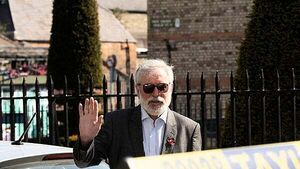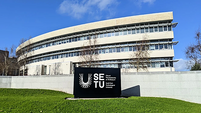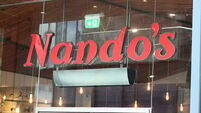Gerry Adams case: Multiple sources corroborated Spotlight information, BBC claims

High Court reporters
The BBC had “multiple, authoritative, credible, confidential” sources corroborating information provided by an anonymous contributor to a documentary at the centre of a defamation action brought by Gerry Adams, lawyers for the broadcaster have told the High Court.
The former Sinn Féin leader claims the BBC Spotlight programme and related article published in 2016 defamed him by falsely accusing him of sanctioning the Provisional IRA’s killing of British agent Denis Donaldson in 2006. The BBC denies it defamed Mr Adams.
Mr Donaldson was shot dead at his cottage in Glenties, Co Donegal on April 4th, 2006. Three years later, the dissident paramilitary group the Real IRA claimed responsibility for his death.
Evidence
Giving evidence at the civil trial hearing into the action on Friday, John O’Loan, an Australian journalist who helped establish Sky News and other TV networks, said the BBC Spotlight programme relied on an uncorroborated, single anonymous source in publishing the “serious, criminal” allegation.
Mr O’Loan, who was called to give evidence by Mr Adams’ legal team, said the BBC did not meet the threshold for responsible journalism in its inclusion and presentation of the allegation made by the anonymous source, dubbed “Martin”, against Mr Adams.
He said the segment lacked sufficient editorial veracity to be published.
Eoin McCullough SC, for the BBC, put it to Mr O’Loan that the broadcaster wrote to Mr Adams’ solicitor after the programme aired, stating: “Martin was not the only source to give the programme team this information, the programme team received the information from multiple, authoritative, credible, confidential sources.”
Mr McCullough said the information was received from both republican and security sources.
Editorial guidelines
Giving his evidence in chief, Mr O’Loan told Mr Adams’ counsel Tom Hogan SC he considered the BBC‘s editorial guidelines when carrying out a review of the Spotlight programme and related article ahead of the trial hearing, compiled at the behest of Mr Adams’ legal team.
He said he was asked to be impartial, independent, and to rely on his expertise.
He said he considered the programme, the article, and various relevant documents, including correspondence between Mr Adams’ and the BBC‘s legal teams.
Mr O’Loan raised several complaints with the broadcast and related article in his report.
He said that the BBC presented no secondary source, documentation or verifying evidence to support the “serious, criminal” allegation made in the programme against Mr Adams.
He said that the anonymous source’s motivations or credibility were not explained, and he was not asked to justify the allegation.
He said that editorial standards applied elsewhere in the programme and generally in the BBC were not applied in handling the allegations complained of.
Mr McCullough put it to Mr O’Loan that correspondence sent by BBC solicitors to Mr Adams’ solicitors after the broadcast in October 2016 stated that information received by the Spotlight team from “Martin” was also received from five other sources.
Letter
Mr O’Loan agreed that he received the letter to review as part of his report, but said that he could not immediately recall reading it. He later said he “believed” he read the letter.
Mr O’Loan agreed that he left the BBC‘s assertion about having multiple credible sources because he believed it was irrelevant. He said that the assertion was “not credible”.
He said that his concern in preparing the report was what the programme conveyed.
Mr McCullough put it to Mr O’Loan that he did not read the letter, to which he responded: “I believe I read it.”
Mr McCullough put it to Mr O’Loan that if he did read it, he decided to deliberately mislead the jury by excluding the BBC‘s assertion.
Mr O’Loan said that if he left things out of his report, it was deliberate.
Mr McCullough also put it to Mr O’Loan that “Martin’s" motivations were discussed in the programme.
Mr O’Loan agreed with Mr McCullough that the protection of sources was important, and especially so in the case of a source who was in the IRA, and was an informant, like “Martin”.
He agreed that programme makers could not include any details that would “run the risk” of identifying “Martin”.
Clinton administration
Bruce Morrison, a former American congressman who worked on the Northern Ireland peace process during President Bill Clinton’s administration, gave evidence to the hearing remotely from Bethesda, Maryland.
Mr Morrison met with Mr Adams during the 1990s. He said his greatest impression of Mr Adams was his political acumen and political commitments. He spoke about the Clinton administration's contribution to the peace process, and meetings between Mr Adams and former US president.
Mr Morrison said that he believed Mr Adams’ reputation presently is one of an elder statesman. He said that Mr Adams is seen as someone who made an extraordinary contribution to change in Northern Ireland, from the time of the Troubles, to living under the Belfast Agreement.
Under questioning from Paul Gallagher SC, for the BBC, Mr Morrison said Mr Adams had been denied visas to the US because of the role of Sinn Féin and its relationship with the IRA.
Asked by Mr Gallagher if Mr Adams’ was denied visas for his perceived association with the IRA, Mr Morrison said he couldn’t speak to that, adding that it “takes only allegations” to deny someone a visa.
Mr Gallagher put it to Mr Morrison that during the Troubles, the British and Irish governments expressed the view that Sinn Féin and the IRA were “inseparable”. Mr Morrison said that some members of government expressed that view.
He said that some viewed Sinn Féin as a product of the IRA.
The trial, before Mr Justice Alexander Owens, continues.




